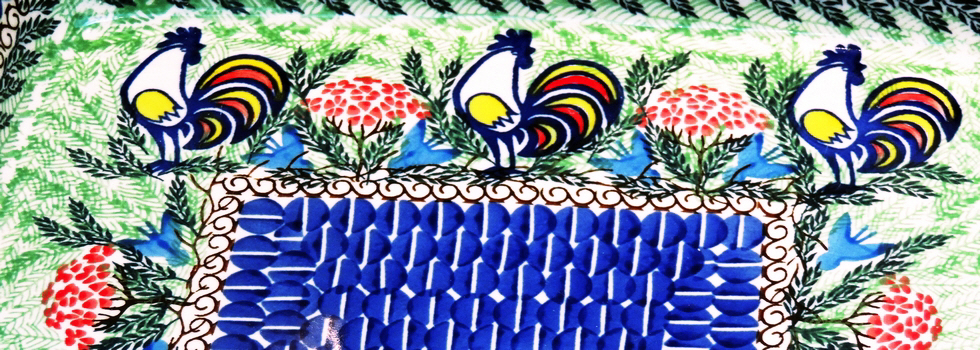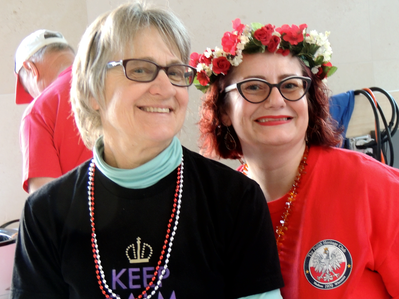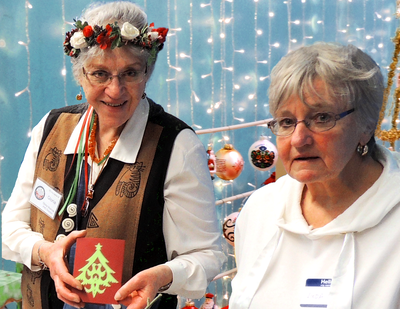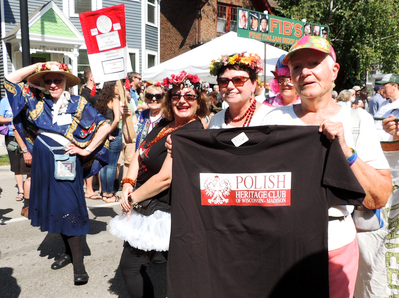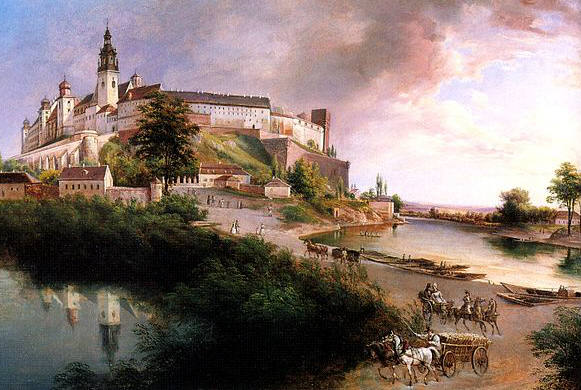 Year 2017 marks the 550 anniversary of the first flis (transport of goods on rafts and floating barges) on the Wisła River after Poland signed the Second Peace of Toruń (1466) with Teutonic Knights and regained access to the upper part of the river and its mouth. Known also as the Queen of Polish Rivers, Wisła is a symbol of Polish identity and cultural heritage. For centuries, it was the main trading artery (for grains, timber and salt) and key factor in the economic boom that made Poland a major political and economic power in Europe during the Polish Golden Age (15th-17th century). [Painting by Jan Nepomucen Głowacki (ca 1847) shows the Wisła river and barge landing at the foot of Wawel, the Royal Castle in Kraków]
Year 2017 marks the 550 anniversary of the first flis (transport of goods on rafts and floating barges) on the Wisła River after Poland signed the Second Peace of Toruń (1466) with Teutonic Knights and regained access to the upper part of the river and its mouth. Known also as the Queen of Polish Rivers, Wisła is a symbol of Polish identity and cultural heritage. For centuries, it was the main trading artery (for grains, timber and salt) and key factor in the economic boom that made Poland a major political and economic power in Europe during the Polish Golden Age (15th-17th century). [Painting by Jan Nepomucen Głowacki (ca 1847) shows the Wisła river and barge landing at the foot of Wawel, the Royal Castle in Kraków]
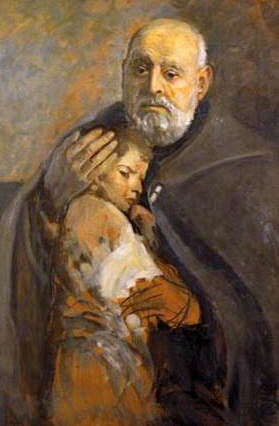 Adam Chmielowski (1845-1916) is also known as the Saint Brother Albert after Pope John Paul II beatified him (1983) and canonized as a Roman Catholic Church saint (1989). The sainthood process started in 1966 under Pope Paul VI who declared him Venerable in 1977. Chmielowski was born into an aristocratic Polish family, fought in the January Uprising (1863), studied engineering in Belgium and became a well-known painter (after studies in Paris and Munich). Later he joined the Third Order of Saint Francis (1887), devoted his life to the poor and homeless, and founded the Albertine Brothers (1888) and Albertine Sisters (1891) congregations of the same order. He is also a hero of the play written by Pope John Paul II, which became a base for the movie "Our God’s Brother" (directed by Krzysztof Zanussi and starring Christoph Waltz and Scott Wilson. [Painting by Leon Wyczółkowski, ca 1901-1902]
Adam Chmielowski (1845-1916) is also known as the Saint Brother Albert after Pope John Paul II beatified him (1983) and canonized as a Roman Catholic Church saint (1989). The sainthood process started in 1966 under Pope Paul VI who declared him Venerable in 1977. Chmielowski was born into an aristocratic Polish family, fought in the January Uprising (1863), studied engineering in Belgium and became a well-known painter (after studies in Paris and Munich). Later he joined the Third Order of Saint Francis (1887), devoted his life to the poor and homeless, and founded the Albertine Brothers (1888) and Albertine Sisters (1891) congregations of the same order. He is also a hero of the play written by Pope John Paul II, which became a base for the movie "Our God’s Brother" (directed by Krzysztof Zanussi and starring Christoph Waltz and Scott Wilson. [Painting by Leon Wyczółkowski, ca 1901-1902]
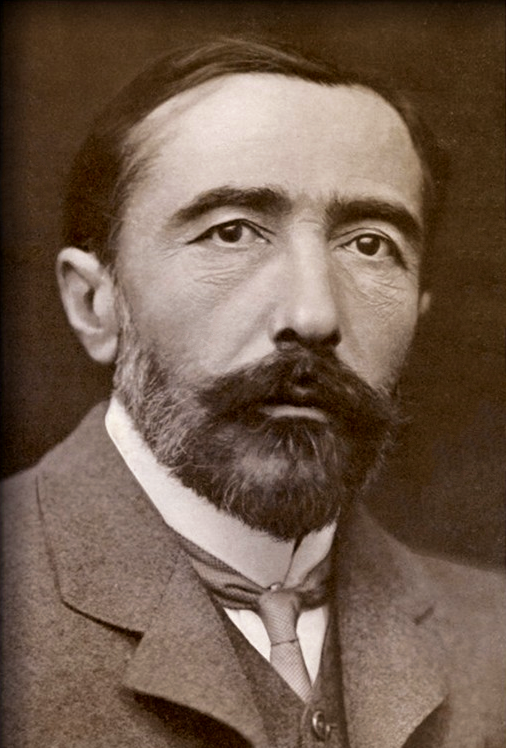 Joseph Conrad (1857-1924) is one of the leading figures in the world's literature and one of the greatest novelists to ever write in English (despite acquiring it only in his twenties). He was born in a fiercely patriotic Polish family as Józef Teodor Konrad Korzeniowski but favored his middle name Konrad received in tribute to poetic works of the great Polish poet, Adam Mickiewicz (Dziady and Konrad Wallenrod). He left Poland in 1874 and began a career in merchant fleet (19 years) resulting in the experiences becoming later a backdrop for the prolific literary work. Translated into many languages and exerting influence on many great writers, his most famous novels include Lord Jim, Nostromo, The Nigger of the 'Narcissus', The Secret Agent, The Shadow Line and Under Western Eyes (banned in the communist Poland). But Heart of Darkness remains his most influential work with adaptations for music and opera scenes, radio and theatre plays, TV productions, motion pictures (Apocalypse Now and Heart of Darkness) and several video games. Conrad's story entitled "The Duel" ("Point of Honor" in the United States) was adopted in the screenplay for the movie The Duellists.
Joseph Conrad (1857-1924) is one of the leading figures in the world's literature and one of the greatest novelists to ever write in English (despite acquiring it only in his twenties). He was born in a fiercely patriotic Polish family as Józef Teodor Konrad Korzeniowski but favored his middle name Konrad received in tribute to poetic works of the great Polish poet, Adam Mickiewicz (Dziady and Konrad Wallenrod). He left Poland in 1874 and began a career in merchant fleet (19 years) resulting in the experiences becoming later a backdrop for the prolific literary work. Translated into many languages and exerting influence on many great writers, his most famous novels include Lord Jim, Nostromo, The Nigger of the 'Narcissus', The Secret Agent, The Shadow Line and Under Western Eyes (banned in the communist Poland). But Heart of Darkness remains his most influential work with adaptations for music and opera scenes, radio and theatre plays, TV productions, motion pictures (Apocalypse Now and Heart of Darkness) and several video games. Conrad's story entitled "The Duel" ("Point of Honor" in the United States) was adopted in the screenplay for the movie The Duellists.
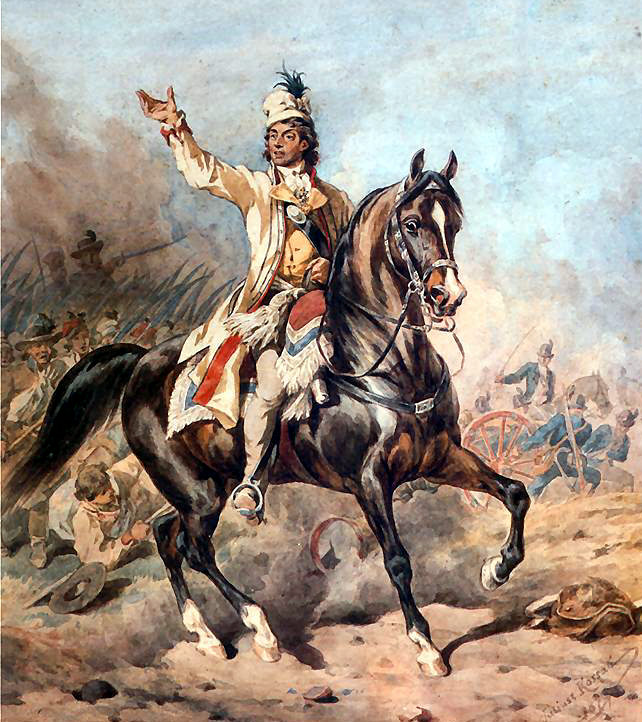 Tadeusz Kościuszko (1746-1817) is a national hero in Poland (Kościuszko Uprising, 1794) and the United States (American Revolutionary War, 1775-1783). He is perhaps the best known Pole in the world with many statues and monuments as well as geographic features named after him. The 200th anniversary of his death is celebrated this year under the patronage of UNESCO in recognition of "...his activity for the sake of peace, independence and democracy – the equality of people regardless of their skin colour or religion... He emphasized the role of both practical and citizen education, so that men and women who regained freedom should be aware of their rights, but also their duties with respect to the freedom and welfare of others..." [Painting by Juliusz Kossak, 1879]
Tadeusz Kościuszko (1746-1817) is a national hero in Poland (Kościuszko Uprising, 1794) and the United States (American Revolutionary War, 1775-1783). He is perhaps the best known Pole in the world with many statues and monuments as well as geographic features named after him. The 200th anniversary of his death is celebrated this year under the patronage of UNESCO in recognition of "...his activity for the sake of peace, independence and democracy – the equality of people regardless of their skin colour or religion... He emphasized the role of both practical and citizen education, so that men and women who regained freedom should be aware of their rights, but also their duties with respect to the freedom and welfare of others..." [Painting by Juliusz Kossak, 1879]
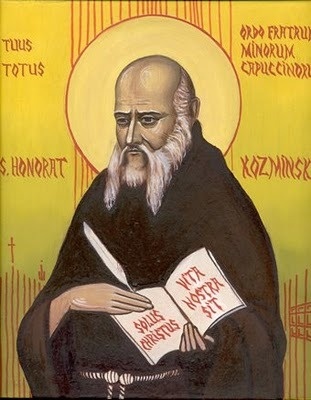 Honorat Koźmiński (1829-1916) was born Florentyn Wacław Jan Stefan Koźmiński in Biała Podlaska. He enrolled in the School of Fine Arts in Warsaw (1845) but Russians arrested him (1846) for conspiring against the tsar. After release from the dreaded X pavilion of Warsaw Citadel, he became a Capuchin monk (1848), a priest (1852), and a founder of the congregations of Felician Sisters (1855) and the Capuchin Sisters of Saint Clare (1860). He was interned for many years after Russians closed all monasteries following the January Uprising (1863). In spite of tsarist bans and continuing revisions & interrogations, he used his "closet" confessional to connect thousands of people and arrange secret gatherings. He organized many covert congregations based on the rule of the Third Order of Saint Francis helping the sick, handicapped and poor. In October 1988, Pope John Paul II proclaimed him Blessed, after the process of beatification commenced in 1929.
Honorat Koźmiński (1829-1916) was born Florentyn Wacław Jan Stefan Koźmiński in Biała Podlaska. He enrolled in the School of Fine Arts in Warsaw (1845) but Russians arrested him (1846) for conspiring against the tsar. After release from the dreaded X pavilion of Warsaw Citadel, he became a Capuchin monk (1848), a priest (1852), and a founder of the congregations of Felician Sisters (1855) and the Capuchin Sisters of Saint Clare (1860). He was interned for many years after Russians closed all monasteries following the January Uprising (1863). In spite of tsarist bans and continuing revisions & interrogations, he used his "closet" confessional to connect thousands of people and arrange secret gatherings. He organized many covert congregations based on the rule of the Third Order of Saint Francis helping the sick, handicapped and poor. In October 1988, Pope John Paul II proclaimed him Blessed, after the process of beatification commenced in 1929.
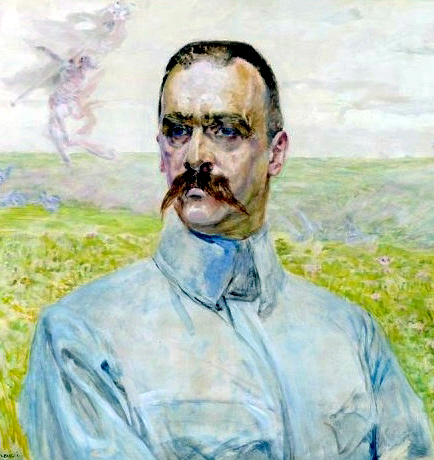 Marshal Józef Piłsudski (1867-1935) was a Polish patriot, social activist and Polish statesman recognized for his pivotal role in the restoration of Polish state (the Second Republic of Poland) after 123 years of partitions between the Austria, Prussia, and Russia empires. Anticipating the outbreak of WWI and believing that Poles have to fight with arms for their independence, he created the Polish Legions in 1914. His vision of Poland was a multicultural state with strong support for ethnic and religious diversity. After Polish state was restored in 1918, Piłsudski was the Chief of State (1918–22) and the First Marshal of Poland leading Polish Army to the victory over the outnumbering Russian forces attacking Poland during the Polish-Soviet war (1919-1921). He was also twice prime minister and de facto leader of Poland in years 1926–1935. [Painting by Jacek Malczewski, 1916]
Marshal Józef Piłsudski (1867-1935) was a Polish patriot, social activist and Polish statesman recognized for his pivotal role in the restoration of Polish state (the Second Republic of Poland) after 123 years of partitions between the Austria, Prussia, and Russia empires. Anticipating the outbreak of WWI and believing that Poles have to fight with arms for their independence, he created the Polish Legions in 1914. His vision of Poland was a multicultural state with strong support for ethnic and religious diversity. After Polish state was restored in 1918, Piłsudski was the Chief of State (1918–22) and the First Marshal of Poland leading Polish Army to the victory over the outnumbering Russian forces attacking Poland during the Polish-Soviet war (1919-1921). He was also twice prime minister and de facto leader of Poland in years 1926–1935. [Painting by Jacek Malczewski, 1916]





